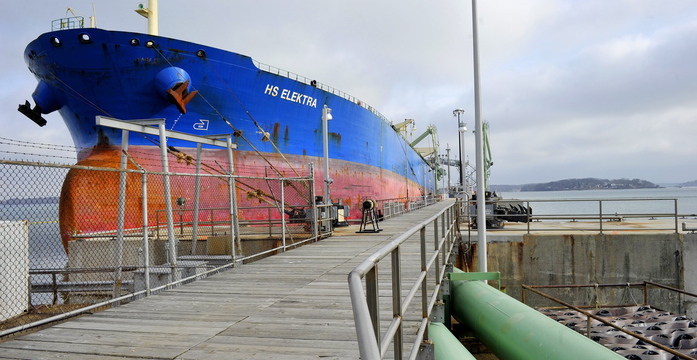The citizen-initiated South Portland Waterfront Protection Ordinance would probably stop Canadian tar sands oil from ever being loaded onto ships in Portland Harbor. If that is all it would do, the ordinance might be a prudent move to protect a vital natural resource.
But unfortunately, the ordinance that goes before city voters Nov. 5 could do much more. The broadly worded regulation would prevent the “enlargement … reconstruction or alteration” of any aspect of the six oil terminals on the South Portland side of the harbor, five of which don’t handle crude oil and would never be involved with the transportation of tar sands.
We find this ordinance as written to be too open to interpretation, too difficult to enforce and too damaging to commerce in the harbor for us to support. While we consider the effort to be well-intentioned, we encourage voters to say “no” on Nov. 5.
MORE THAN TAR SANDS
The problems with the ordinance result from what it can’t say. Supporters wanted an ordinance to prevent the Portland Pipe Line Corp. from pumping Canadian tar sands into ships here, instead of exporting crude oil to Canada. But because the pipeline is regulated by federal law, a local ordinance banning tar sands would not survive a court challenge. That’s why the proposed ordinance regulates land use and proscribes the activities that would allow the pipeline to reverse its flow and begin loading ships instead of unloading them.
But the restrictive language describes more than a pipeline that moves tar sands. In the broadest possible way, the ordinance would say, “there shall be no enlargement or expansion of existing petroleum storage tank farms and accessory piers, pumping and distribution facilities or facilities for the storing and handling of petroleum and/or petroleum products.”
It goes on to define “expansion” as the “construction, reconstruction or alteration of any existing facility to change the function or capacity of such facilities … .”
That could easily be invoked to stop all of the businesses that now receive, store and transport gasoline and heating oil from modernizing their equipment or facilities.
NOT THEIR INTENT
Supporters say they have no intention of further regulating those businesses, which they say would be protected by language elsewhere in the ordinance. They say that terminals that offload oil products from ships would be grandfathered, while the new restrictions would apply only to terminals that would load petroleum onto ships.
That might be how city officials interpret the law in the future, but there’s no guarantee that they won’t use the more restrictive reading. That uncertainty alone might be enough to chill investment in the South Portland waterfront and prevent companies from carrying out upgrades and introducing new lines of business, bringing on the decline of a valuable local industry.
You don’t have to believe the worst-case scenarios presented by the ordinance’s opponents to see that South Portland would lose out on local tax revenue and jobs if the oil industry scaled back its operations here.
A “no” vote is not necessarily a vote in favor of bringing tar sands into Portland Harbor. It can also be a vote that directs ordinance supporters to try to find a more focused approach to reaching their goal.
We encourage South Portland voters to say “no” to the ordinance and “yes” to looking for the right balance between environmental protection and the working waterfront.
Send questions/comments to the editors.



Success. Please wait for the page to reload. If the page does not reload within 5 seconds, please refresh the page.
Enter your email and password to access comments.
Hi, to comment on stories you must . This profile is in addition to your subscription and website login.
Already have a commenting profile? .
Invalid username/password.
Please check your email to confirm and complete your registration.
Only subscribers are eligible to post comments. Please subscribe or login first for digital access. Here’s why.
Use the form below to reset your password. When you've submitted your account email, we will send an email with a reset code.